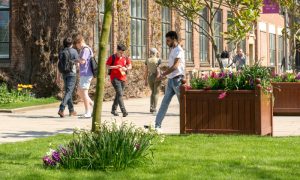The COVID-19 pandemic has devastated economies around the world. Hundreds of thousands of people have lost their jobs in the UK alone. Many are looking to higher education to help them upskill or reskill. Universities strive to meet that demand, which needs flexible remote learning geared to students and the job market requirements. At the pandemic’s start in March 2020, the University of Hull decided to start teaching all courses online. In fact, they already had a virtual learning platform that all students access for additional teaching materials. It was enhanced while students had to study remotely.

Lectures were delivered live so students could access the information as it was taking place too. The university’s library has many materials available online. Students could book out books and collect them at a specific time. “With all their learning needs met, we turned to pastoral care. It ensured that students were well supported in other areas such as housing, financial support, mental health, and wellbeing. Although the campus was closed for teaching, it remained open for those living in university accommodation, with catering provided too,” shares Emma Payne, International Recruitment Manager, University of Hull.
The main worry for the university was if as many students would continue to study overseas as the pandemic progresses, much smaller businesses would have felt the impact financially. To support students, the University of Hull created a new fee schedule for international students to match international fees to UK students by bringing down the cost of overseas study. For the current academic year of 2021-22, the University of Hull will continue this fee policy for September 2022 going forward.
Achieving Academic Excellence with Ease

Founded in 1927, the University of Hull is proud to play a leading role in the UK’s educational, social, economic, and cultural development. The global perspective and expertise of the talented people and their dynamic collaborations with partners locally, nationally, and internationally enable the university to bring communities together. It has enriched lives, addressed the challenges faced by the region, and shared transferable solutions across an increasingly connected yet polarised world. “It is this union between education, research and knowledge exchange, and between the local and the global, which defines our internationally engaged civic university,” says Emma.
Motivated by society’s challenges and inspired by the global community’s power, the University of Hull is shaping a fairer, brighter, and carbon-neutral future. They are advancing education, scholarship, knowledge, and understanding through teaching and research to benefit individuals and society at large. The University of Hull is empowering people to succeed, recognizing that with empowerment comes responsibility and accountability. The University of Hull does outstanding world-leading research where Ph.D. students achieve bigger and better things. One of their current students, Joyjit Chatterjee undertaking a Ph.D. in Computer Science, is doing his research that aims to develop an AI-driven trustworthy decision support system for the wind industry, to provide transparent and explainable predictions of incipient faults in turbines deployed in challenging environments (e.g., offshore), and generate human-intelligible maintenance actions to fix/avert these failures, potentially helping make turbines more reliable.
Shaping a Brighter Future

The University of Hull is a great study destination for all international students, with a vibrant community coming from across the world. The Indian community adds to this mixture, bringing their culture and style to everything that is Hull. The Indian students in Hull love the green spaces on campus. This quieter environment helps students to study and engage more with their academics and peer groups.
With 44 graduate students and 123 master’s students, Indian students have chosen business management and AI and Data Science degrees in large numbers for the last intake in September 2021. However, students choose a wide range of subjects from logistics and supply chain management in Hull University Business School, to MSc Cardiovascular Rehabilitation, advanced chemical engineering or advanced chemistry, to MSc Environmental Change, Management, and Monitoring. International students come to Hull for a wide range of reasons, from the great subjects they teach to the fantastic facilities used by the students and academics working towards new research that enhances the world they live in. The University of Hull’s best feature is VIPER. This University supercomputer is used by students from a range of subjects from accounting to astrophysics.
Every Indian student at Hull has the most fantastic experience and cannot wait to share this with their friends and family back home. They also want to give back, helping the university move forward over the next decade. The students have a chance to make the life they want, whether that’s meeting people from all over the world, connecting with their Indian peer group, creating groundbreaking research. The University of Hull gives them every opportunity to take what they need. There are different clubs and societies that will enhance students’ skills, which will help them in the future. The University of Hull is carefully analyzing what is happening in the UK and globally and making changes as it needs to. Such as requesting, everyone on campus be vaccinated, if possible, wear masks in indoor spaces, and undertake regular COVID testing. “Giving access to these areas by providing COVID testing on campus, face coverings, and on-campus vaccination program, The University will continue to monitor the situation and make the best decision for the students and staff to ensure everyone is as safe as possible,” concludes Emma.

Emma Payne, International Recruitment Manager, University of Hull
Emma Payne has worked in international higher education for 16 years in various roles. Emma’s genuine warmth and passion about study in the UK comes through, especially when speaking to students about their futures. Emma’s empathetic and sincere nature comes from her intercultural communication abilities to support students daily. Emma is from the UK and lives in the city of Hull. She loves traveling to India and misses the people when in the UK. She currently works as the International Recruitment Manager for South Asia in the Global Student Recruitment Office at the University of Hull.




